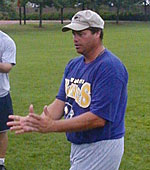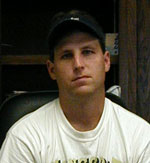Stringer death has impact in youth football camps
By Tim Pugmire, Minnesota Public Radio
August 1, 2001
The heat stroke death of Minnesota Vikings player Korey Stringer (See story) has had an effect on several football fields and training rooms around the Twin Cities. Coaches and players from area colleges and high school teams say the tragedy will lead to a more cautious approach to their own practice plans.
ONE-HUNDRED-TWENTY STUDENTS from several Minneapolis and St. Paul high schools are at Hamline University this week, polishing their football skills as part of an annual camp sponsored by a Minnesota Vikings alumni group. Camp instructor Dick Weinberger directs the offensive linemen through a series of drills during a light rain. He says the coaches have tried to work around this week's heat.
"You're going to have work sessions where you're going pretty hard, and then we try to follow that up with more of an instructional time where we're not going as hard. The instructional times when we're just talking to kids more, we've tried to get then into some shade. Just so you're not in the heat constant, going hard constant without some of the natural breaks," Weinberger says.
The players at the camp also don't wear helmets or pads, just gym shorts and their matching Vikings t-shirts. Some already cut off their sleeves for extra comfort. They spent much of Wednesday talking about Korey Stringer's heat-related death.
Robie Anderson, who'll be senior at St. Paul's Humboldt High, says he was depressed to hear the news. He says it will play on his mind later this month when his high school team starts practicing "in very hot conditions and full uniforms. It makes me think twice," he says.
Coaches will also be thinking twice. Weinberger, who's an assistant coach at the University of Wisconsin-Stout, says he's always applied strict rules on his players about drinking plenty of water during practices. "I talk to my players; when they need water, they take it. When I tell them to take water, they take it. When I tell them there's a water break, it's not optional, because the body is dehydrated even before they're thirsty," he says.
At Concordia University in St. Paul, third-year coach Shannon Currier is preparing for 118 players to report for the start of pre-season training on August 12th. He says players who are competing for positions, and trying to impress coaches, are not likely to admit they're having problems with the heat.
Currier says he relies heavily on the team trainer and his assistant coaches to keep an eye out for problems. "We'll even weigh kids in prior to practice, and then weigh them in after practice. And if they've dropped a lot of weight, that means there's a lot of water weight loss, and therefore our trainer is really going to follow that particular person throughout practice and make sure he's doing OK," Currier says.
The 30-year-old Currier says he's never been around a football program that didn't take extra precautions in hot weather or didn't provide players with plenty of water. Older coaches tell a different story. "I remember when it was looked down upon for anyone to need water," says Jack Osberg, the longtime coach at Augsburg College in Minneapolis. He's been coaching football for 40 years and has seen a dramatic shift in coaching attitudes.
Despite better awareness and precautions, football deaths appear to be a bigger threat today than in past decades. A University of North Carolina study found 18 high school and college players died of heat stroke or related conditions since 1995. Osberg says today's players are pushing themselves harder and are more competitive. "Sometimes that athlete feels like 'Well, gosh, if I back off a little bit or drop to a knee and just take a break or a breather, will I lose ground and that sort of thing?' And that mindset is a little more prominent nowadays, and maybe people or even coaches aren't totally aware of it," says Osberg.
Osberg says it's up to coaches to convince their players they should take themselves off the field when they're not feeling well. He says he hopes the tragic death of Korey Stringer will help other football players by raising awareness even more about the dangers of hot weather.
By Tim Pugmire, Minnesota Public Radio
August 1, 2001
|
|
RealAudio |
The heat stroke death of Minnesota Vikings player Korey Stringer (See story) has had an effect on several football fields and training rooms around the Twin Cities. Coaches and players from area colleges and high school teams say the tragedy will lead to a more cautious approach to their own practice plans.
| |
|
|
|
||
"You're going to have work sessions where you're going pretty hard, and then we try to follow that up with more of an instructional time where we're not going as hard. The instructional times when we're just talking to kids more, we've tried to get then into some shade. Just so you're not in the heat constant, going hard constant without some of the natural breaks," Weinberger says.
The players at the camp also don't wear helmets or pads, just gym shorts and their matching Vikings t-shirts. Some already cut off their sleeves for extra comfort. They spent much of Wednesday talking about Korey Stringer's heat-related death.
Robie Anderson, who'll be senior at St. Paul's Humboldt High, says he was depressed to hear the news. He says it will play on his mind later this month when his high school team starts practicing "in very hot conditions and full uniforms. It makes me think twice," he says.
| |
|
|
|
||
At Concordia University in St. Paul, third-year coach Shannon Currier is preparing for 118 players to report for the start of pre-season training on August 12th. He says players who are competing for positions, and trying to impress coaches, are not likely to admit they're having problems with the heat.
Currier says he relies heavily on the team trainer and his assistant coaches to keep an eye out for problems. "We'll even weigh kids in prior to practice, and then weigh them in after practice. And if they've dropped a lot of weight, that means there's a lot of water weight loss, and therefore our trainer is really going to follow that particular person throughout practice and make sure he's doing OK," Currier says.
The 30-year-old Currier says he's never been around a football program that didn't take extra precautions in hot weather or didn't provide players with plenty of water. Older coaches tell a different story. "I remember when it was looked down upon for anyone to need water," says Jack Osberg, the longtime coach at Augsburg College in Minneapolis. He's been coaching football for 40 years and has seen a dramatic shift in coaching attitudes.
| |
|
|
|
||
Despite better awareness and precautions, football deaths appear to be a bigger threat today than in past decades. A University of North Carolina study found 18 high school and college players died of heat stroke or related conditions since 1995. Osberg says today's players are pushing themselves harder and are more competitive. "Sometimes that athlete feels like 'Well, gosh, if I back off a little bit or drop to a knee and just take a break or a breather, will I lose ground and that sort of thing?' And that mindset is a little more prominent nowadays, and maybe people or even coaches aren't totally aware of it," says Osberg.
Osberg says it's up to coaches to convince their players they should take themselves off the field when they're not feeling well. He says he hopes the tragic death of Korey Stringer will help other football players by raising awareness even more about the dangers of hot weather.



